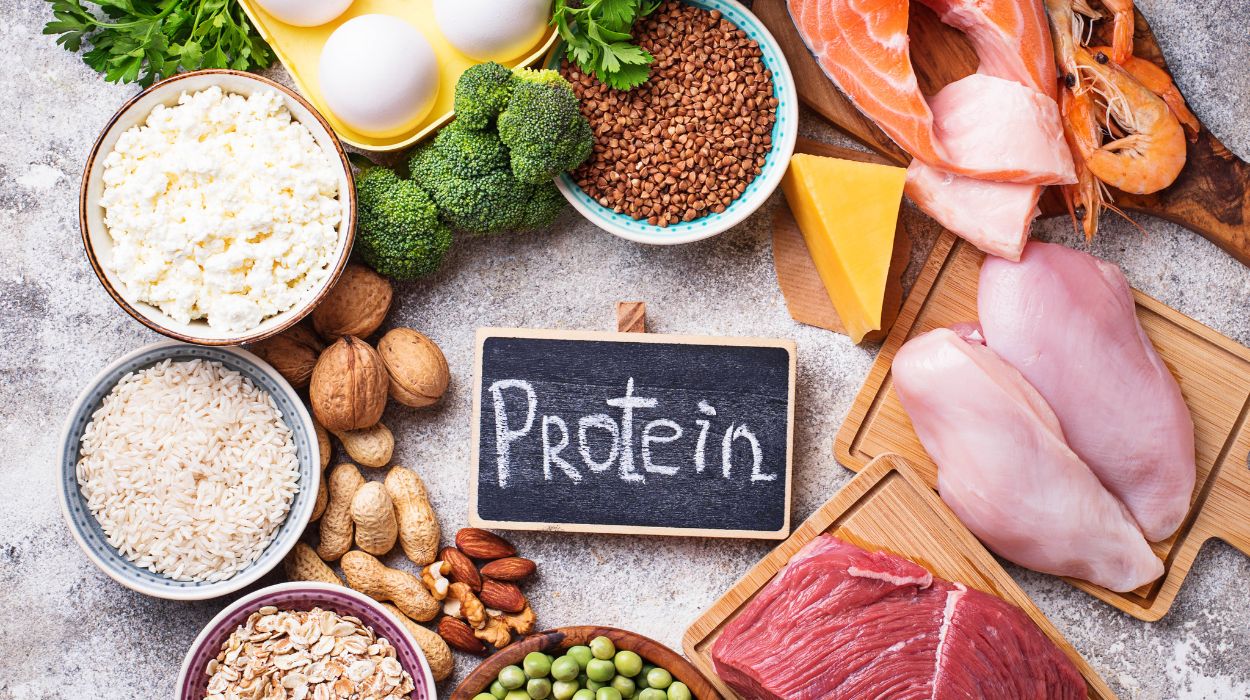 Expert's opinion
Expert's opinion
Expert's opinion
The article is a subjective view on this topic written by writers specializing in medical writing.
It may reflect on a personal journey surrounding struggles with an illness or medical condition, involve product comparisons, diet considerations, or other health-related opinions.
Although the view is entirely that of the writer, it is based on academic experiences and scientific research they have conducted; it is fact-checked by a team of degreed medical experts, and validated by sources attached to the article.
The numbers in parenthesis (1,2,3) will take you to clickable links to related scientific papers.
How To Lose Weight Fast – 9 Evidence-backed Tips For Slimming Fast 2024

As dozens of new fad diets that promise to help you lose 10 pounds within a week — or even less — continue to emerge, the desire for quick weight loss is at an all-time high.
Although it may sound tempting, falling for fad diets can lead to a vicious cycle of dieting ( yo-yo dieting), setting you back on your weight loss goals.
While you can make a few lifestyle tweaks to boost your metabolism and support your weight loss efforts, there is no magic pill or diet that will result in actual, instant weight loss. Plus, dropping pounds too quickly is not always safe or sustainable.
This article will discuss how to lose weight fast and safely to help you crush your health and fitness goals this year.
9 Evidence-backed Tips to lose weight fast and Safely
Here, we’ve compiled nine tips to help promote sustainable weight loss.
How To Lose Weight Fast and Safely
A healthy, safe rate of weight loss of one to two pounds[1] per week for a period of six months can help you lose weight relatively quickly. You’ll need to decrease your caloric intake and increase your exercise by 500 – 1,000 calories per day.
In order to lose weight and keep it off, it’s important to adopt long-term healthy habits that you can stick with over time.
Cut Back Ultra-Processed Carbohydrates, and Sweets
Ultra-processed foods[2] are typically formulated with several ingredients, such as added sugar, hydrogenated fats, and starches. They also may contain artificial flavors, colors, stabilizers, or other additives.
Because they are cheap and convenient, heavily processed foods are often a staple in many American households. However, they can really hinder your weight loss efforts and put your health at risk.
For example, one study[3] looked at 20 healthy male and female adults who ate either a minimally processed diet or an ultra-processed diet for two weeks. Each person spent two weeks on both diets.
Both diets included three meals a day plus snacks with the same number of calories, sugar, fat, and carbs. Participants were allowed to eat as much or as little as they wanted.

On average, people ate about 500 additional calories from carbohydrates (carbs) and fat per day on the ultra-processed diet than on the minimally processed diet. Over the two weeks, this led to a two-pound average weight gain. In contrast, the minimally processed diet led to a two-pound weight loss.
Ultra-processed foods to limit:
- Some types of bread
- Energy drinks
- Pizza
- Packaged cookies
- Frozen dinners
- Hot dogs and cold cuts
Exercising
Exercising is not required to lose weight and — no matter how hard you try — you can’t out-exercise a poor diet. However, cardio and strength training can be extremely beneficial to support weight loss and improve body composition.
Physical activity can help you burn more calories. It can also help maintain and increase lean body mass.
Strength training, in particular, can be beneficial to help you lose weight faster. Lifting weights builds lean muscle mass, which is more metabolically active than fat at rest.
Both the Centers for Disease Control and the American College of Sports Medicine recommend that healthy adults engage in moderate-intensity aerobic physical activity for 30 minutes at least five days a week. Additionally, they recommend strength training at least two days per week.
Eating Plenty of Fiber, Protein, and Healthy Fats
Instead of restricting food groups, try to focus on incorporating more whole foods into your diet. Whole foods are satiating, but they’re also chock full of nutrients that can provide numerous health benefits.
Vegetables
Vegetables are an essential part of a whole foods diet. They are rich in vitamins, minerals, fiber, and incredibly filling.
Some of the best low-calorie veggies to eat are non-starchy vegetables like broccoli, asparagus, spinach, cauliflower, and leafy greens.
Starchy vegetables such as corn, peas, and sweet potatoes are good for you and high in fiber, but they have a higher carb and calorie content, so you’ll want to include them in smaller portions.
Protein
Protein is arguably one of the most important nutrients for weight loss. Scientific evidence[5] suggests that higher-protein diets that consist of 1.2 and 1.6 grams of protein per kilogram of body weight can help improve appetite, regulate weight, and lower a person’s risk of developing cardiovascular disease and diabetes.

As a general rule of thumb, aim to include between 25 and 30 grams of protein with each meal.
Great sources of protein include:
- Lean chicken, pork, turkey, and beef
- Salmon, trout, tuna, and shrimp
- Eggs
- Plant-based proteins like legumes, beans, quinoa, and tofu
Healthy Fats
For years, fat has been one of the most vilified macronutrients in American diets. However, this is simply not true. Healthy fats are essential and should be included in a balanced diet. In fact, some research[6] suggests that healthy fats play a role in appetite regulation and can help you feel fuller longer.
Good sources of healthy fats include
- Olive oil
- Avocado oil
- Salmon
- Nuts
- Seeds
- Avocados
The American Heart Association recommends limiting saturated fat from foods like butter, fatty cuts of meat, and coconut oil to less than 5-6% of your total calories per day. This equals about 11-13 grams of saturated fat on a 2,000-calorie diet.
Build a Better Breakfast
The fastest way to lose weight is by eating a healthy, well-balanced breakfast.
The best breakfast for quickly losing weight will be between 300 and 500 calories[7] and include protein, healthy fat, and fiber to keep you satisfied until your next meal.
Some balanced breakfast ideas include:
- Boiled eggs with sliced avocado and a cup of berries
- Unsweetened Greek yogurt topped with berries and nuts or seeds
- Protein smoothie made with almond milk, frozen fruit, spinach, protein powder, and unsweetened yogurt
Stay Hydrated
Studies show that staying hydrated and drinking water can help with weight loss in several different ways.
For example, one study[8] found that people who drank two glasses of water before a meal ate 22% less than those who didn’t drink water before their meal.

Additionally, experts[8] believe water can help curb a person’s appetite, make exercise easier and more efficient, and boost metabolism.
In general, a person should aim to consume half of their body weight[9] in water. However, if you work or exercise outside frequently, you may need more.
It’s important to note that simply increasing your water intake will not likely lead to significant weight loss. Adequate water intake should always be paired with a calorie reduction and an overall healthy lifestyle.
Keep a Food Journal
Tracking your food intake can help you become more aware of your eating habits and overall patterns, which can help you lose weight.
One study[10] looked at 142 overweight or obese people who were enrolled in an online weight-loss program where they logged meal intake for six months.
Researchers found that participants who consistently logged their meal intake saw the most weight loss. What’s more, the average time it took participants each day to log meals was just 15 minutes.
Intermittent Fasting
Intermittent fasting, or IF, involves choosing regular time periods to eat and fast. For example, someone may choose to eat only during an eight-hour window each day and fast for the remaining 16 hours.
According to a review[11] of 40 studies, intermittent fasting can lead to a weight loss of seven to 11 pounds over ten weeks. However, it is important to note that the studies in the review used different designs, participant characteristics, and methods.
During periods of fasting, insulin levels drop, causing cells to release stored glucose as energy. When this process repeats, as it does with IF, it may help you lose weight safely as it does with IF.
Additionally, IF typically results in an overall calorie reduction, promoting weight loss.
Eat Mindfully
Mindful eating[11] is a practice where a person pays full attention to their food. This includes buying, cooking, and eating it.
As our lives seem to get busier with each passing day, it can be easy to fall into habits such as eating lunch at your desk, scrolling through social media while eating lunch, and eating in the car.
Below are some tips for beginning the practice of mindful eating:
Begin with small portions: Aim to keep your plate size less than 9 inches
Sit down to eat: Sitting down at a table can help you pay attention and appreciate your food and surroundings
Take small bites: Taking smaller bites allows you to enjoy the texture, flavor, and aroma of the food you are eating. Try to put your utensil down between each bite.
Chew thoroughly and eat slowly: Chewing your food well can help release the flavor for you to enjoy. It may take between 20 and 40 chews to thoroughly chew a mouthful of food.
Get More Sleep

Getting a good night’s sleep is one of the best things you can do to support yourself on your weight loss journey. In fact, poor sleep patterns can hinder weight loss efforts and actually lead to weight gain.
For example, experts believe not getting enough sleep during periods of dieting can reduce the amount of weight loss[12] and lead to overeating[13].
To improve sleep, try to reduce stress, avoid eating right before bed, keep a regular sleep schedule, and avoid artificial exposure to light before bed.
What Can You Expect on A Healthy Fast Weight Loss Plan?
Many people may notice the number on the scale down several pounds during the first week of following a new diet plan. This is often a combination of true bodyweight loss in addition to water weight loss.
After the first week, you should notice a healthy, safe weight loss of 1-2 pounds per week. If you find that you are consistently losing more than 2 pounds per week, you may need to adjust your eating habits or exercise regimen.
While rapid weight loss may seem like a good thing, weight loss beyond what is considered safe can put you at risk for health problems[14] and nutrient deficiencies.
In contrast, if you aren’t noticing steady weight loss after several weeks, you may also need to tweak your diet or exercise regimen.
With a modest weight loss of just 5-10% of your body weight, you may begin to notice health benefits[15] such as
- Lower blood pressure
- Lower triglyceride levels
- Improved sleep
- Better energy levels
- Better self-esteem
- Reduced joint pain
- Improved insulin resistance
Conclusion
Losing weight is a complex process that takes dedication, time, and effort. By adopting healthier eating habits, reducing your calorie intake, and including more nutrient-rich, whole foods into your diet, you will be able to lose weight quickly without experiencing feelings of deprivation.
Additionally, incorporating physical activity can also further increase your total daily calorie burn and complement a low-calorie diet. Although a healthy weight loss of 1-2 pounds per week is considered safe and healthy, the speed of weight loss can vary depending on each person.
If you are looking for rapid, quick weight loss beyond the recommended amount, it’s best to speak with your doctor beforehand because there are risks involved.
+ 15 sources
Health Canal avoids using tertiary references. We have strict sourcing guidelines and rely on peer-reviewed studies, academic researches from medical associations and institutions. To ensure the accuracy of articles in Health Canal, you can read more about the editorial process here
- Nih.gov. (2022). Key Recommendations. [online] Available at: https://www.nhlbi.nih.gov/health/educational/lose_wt/recommen.htm.
- McManus, K.D. (2020). What are ultra-processed foods and are they bad for our health? – Harvard Health. [online] Harvard Health. Available at: https://www.health.harvard.edu/blog/what-are-ultra-processed-foods-and-are-they-bad-for-our-health-2020010918605#.
- National Institutes of Health (NIH). (2019). Eating highly processed foods linked to weight gain. [online] Available at: https://www.nih.gov/news-events/nih-research-matters/eating-highly-processed-foods-linked-weight-gain.
- Mayo Clinic. (2020). Can you boost your metabolism? [online] Available at: https://www.mayoclinic.org/healthy-lifestyle/weight-loss/in-depth/metabolism/art-20046508.
- Leidy, H.J., Clifton, P.M., Astrup, A., Wycherley, T.P., Westerterp-Plantenga, M.S., Luscombe-Marsh, N.D., Woods, S.C. and Mattes, R.D. (2015). The role of protein in weight loss and maintenance. The American Journal of Clinical Nutrition, [online] 101(6), pp.1320S1329S. Available at: https://pubmed.ncbi.nlm.nih.gov/25926512/.
- Rania Abou Samra (2022). Fats and Satiety. [online] Nih.gov. Available at: https://www.ncbi.nlm.nih.gov/books/NBK53550/#.
- pogored (2020). How to Build a Healthy Breakfast for Weight Loss. [online] Cleveland Clinic. Available at: https://health.clevelandclinic.org/how-to-build-a-healthy-breakfast-for-weight-loss/.
- Johns Hopkins University (2020). Yes, drinking more water may help you lose weight. [online] The Hub. Available at: https://hub.jhu.edu/at-work/2020/01/15/focus-on-wellness-drinking-more-water/.
- Umsystem.edu. (2012). How to calculate how much water you should drink | University of Missouri System. [online] Available at: https://www.umsystem.edu/totalrewards/wellness/how-to-calculate-how-much-water-you-should-drink.
- missone (2019). Log a Food Journal, Lose More Weight. [online] Cleveland Clinic Newsroom. Available at: https://newsroom.clevelandclinic.org/2019/04/29/log-a-food-journal-lose-more-weight/.
- The Nutrition Source. (2020). Mindful Eating. [online] Available at: https://www.hsph.harvard.edu/nutritionsource/mindful-eating/.
- Nedeltcheva, A.V., Kilkus, J.M., Imperial, J., Schoeller, D.A. and Penev, P.D. (2010). Insufficient Sleep Undermines Dietary Efforts to Reduce Adiposity. Annals of Internal Medicine, [online] 153(7), p.435. Available at: https://pubmed.ncbi.nlm.nih.gov/20921542/.
- St-Onge, M.-P., McReynolds, A., Trivedi, Z.B., Roberts, A.L., Sy, M. and Hirsch, J. (2012). Sleep restriction leads to increased activation of brain regions sensitive to food stimuli. The American Journal of Clinical Nutrition, [online] 95(4), pp.818–824. Available at: https://pubmed.ncbi.nlm.nih.gov/22357722/.
- Mayo Clinic. (2020). Fast weight loss: What’s wrong with it? [online] Available at: https://www.mayoclinic.org/healthy-lifestyle/weight-loss/expert-answers/fast-weight-loss/faq-20058289.
- CDC (2022). Losing Weight. [online] Centers for Disease Control and Prevention. Available at: https://www.cdc.gov/healthyweight/losing_weight/index.html.



